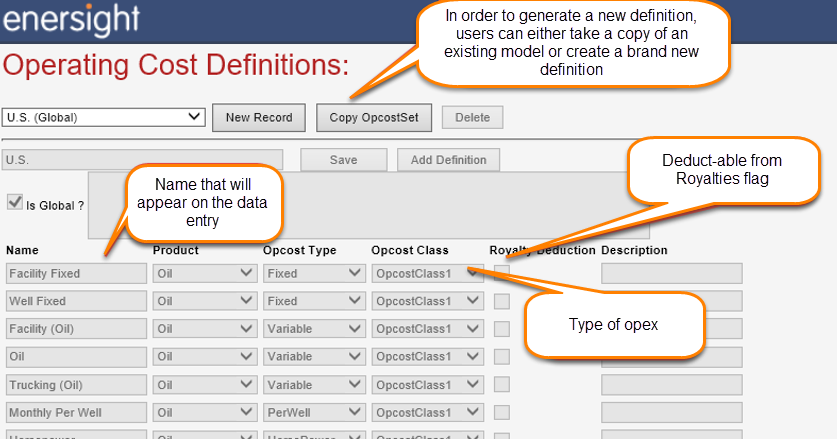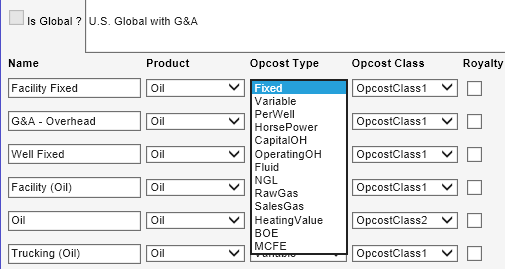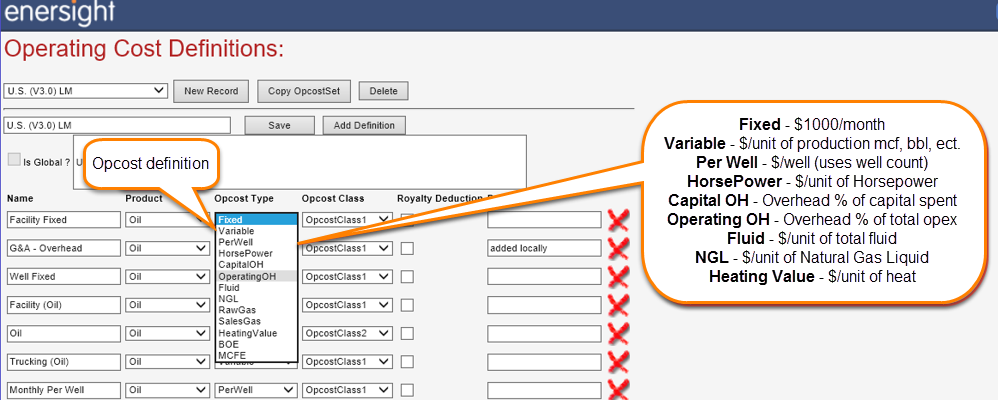Operating costs are the expenses which are related to the operation of business, or to the operation of a device, component, piece of equipment or facility. They are the cost of resources used by an organization just to maintain its existence. Operating costs can be fixed or variable. They start on a given date and will continue to be assigned until either the asset ends or they are replaced with new operating costs with a later effective date. Opcosts with the same effective date will be additive, allowing you to break out opcosts for reporting purposes.
Fixed opcosts can be set to wait until production starts through the checkbox.
Users can define and customized operational cost definitions in Enersight.
Opcost Definitions
Operating cost definitions are customizable in Enersight. To change the opcost definitions go to "Admin à Opcost Definitions."

Click image to expand or minimize.
The following Operating Cost Definition screen will appear:

Click image to expand or minimize.
Royalty deduction depends upon the particular Fiscal Regime specified in the Economic Model. This check box is applicable in cases where only some operating costs are deductible. For regimes like the US, the deduction of costs is controlled on an all-or-nothing basis as specified within the regime itself, meaning that this toggle is not applicable in these cases.
Where a Per Well Opcost type is utilized, the behavior of this differs depending on whether the cost is backallocated or not to the well at the specific facility where it is imposed. Where back allocated, the cost is scaled based upon the well’s rate of take through that specific facility. Where not back allocated, it charges the full amount of operating cost per well for any well contributing to its flow.
If you wish to change the operating cost, or capital definitions, you must have your own custom model which Quorumcan quickly create for you. Please contact Enersight support at support@enersight.com for more information.
To change your operating cost definition
- Copy an existing set (or create a new record)
- Name the opcost set
- Click on "Add Definition" to create additional rows of opex
- Select the product that it applies to
- Choose the opcost type (see list below)
- Specify whether or not it is an eligible royalty deduction
- Provide a description (optional)
- Save when you are done
- You must modify the economic model to link your new definitions to your economic models (See Economic Models)

Click image to expand or minimize.

Click image to expand or minimize.
To enter operating costs into a project, see Operating Costs in the Data Entry section of this guide.
Standard Opcost Definitions
The Best Practice for operating cost class is to only use the “Total” of each class and not use the separate Variable and Fixed reporting elements. This keeps it much cleaner as to what to report and what to include in a Plan Dataset or export. The default reports only report the “Total” for each class. Report Variable Example:”Opcost.Class9.Total”
Enersight Best Practice Standards
Class 1 Capital Expensed to Opcost
Class 2 Fixed Well/Direct Costs
Class 3 Gas Costs – At Well/Direct
Class 4 Oil Costs – At Well/Direct
Class 5 Water Costs – At Well/Direct
Class 6 Steam Costs – At Well/Direct (Steam, and Water Inj)
Class 7 Other Costs – At Well/Direct (C02, etc)
Class 8 Fixed Facility Costs -Facility/Indirect
Class 9 Transport Gas Costs – -Facility/Indirect
Class 10 Transport Oil Costs – -Facility/Indirect
Class 11 Transport Water Costs – -Facility/Indirect
Class 12 Transport Steam Costs – -Facility/Indirect (Steam, and Water Inj)
Class 13 Transport Other Costs – -Facility/Indirect (C02, etc.)
Class 14 G&A costs
Class 15 Capital Overhead
Class 16 Operating cost Overhead
Class 17 Undefined – Client Specific
Class 18 Undefined – Client Specific
Class 19 Undefined – Client Specific
Class 20 Undefined – Client Specific
